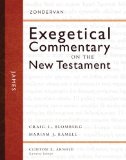James. Zondervan Exegetical Commentary on the New Testament. By Craig L. Blomberg and Mariam J. Kamell. Grand Rapids: Zondervan, 2008. 280 pp. Cloth, $24.99.
The Epistle of James has long been a key support for the teaching of Lordship Salvation. For the most part this commentary does not wade into a discussion of what one must do to have everlasting life. The authors clearly indicate that they believe James is teaching that post-conversion works are necessary to be glorified and to make it into Christ’s Kingdom (e.g., pp. 129, 131, 132). Yet they steer clear of indicating whether they agree with Calvinism or Arminianism (p. 253).
The authors writing style is very clear and easy to follow. Pastors, Bible teachers, and students of the Bible will find much help in this commentary. JOTGES readers will find themselves in disagreement with much of the discussion since they authors follow the commentary tradition on James for the most part and that tradition is decided not consistent with a Free Grace understanding of the letter. However, the observations Blomberg and Kamell make are often outstanding even if those observations do not lead them to the most logical interpretation.
The discussion of Jas 2:14-16 is a case in point. The authors note the repetition of the phrase “what does it profit?” (ti to ophelos) at the start of 2:14 and the end of 2:16, saying, “Just as words without action profited the poor person nothing, so faith without works profits the ‘believer’ nothing” (p. 131). Were it not for the fact that they put believer in quotes and that they indicate he is unregenerate (pp. 129-43), this observation would lead them to the view that James is warning born-again people of the danger of not applying what they believe. Failure to apply one’s faith results in a non-profit religion. The issue is not one’s eternal destiny, but temporal prosperity of oneself and one’s fellow believers.
The authors make this remarkably clear (yet incorrect) statement about salvation in James: “The verb ‘save’ (sosai) in James refers to the entire process that begins with initial faith in Christ and climaxes in heavenly glorification” (p. 129). Note that the authors state the salvation in James is a “process,” not something which one gains at a point in time. They also reject the idea that one gains this salvation by faith alone. (Indeed, at one point they define faith as “commit[ing] one’s life to Christ” [p. 139] and another time they say that “faith includes works” [p. 131]).
This statement about justification by faith is striking: “Where ‘Paul denies the need for pre-conversion works,’ James emphasizes the absolute necessity of post-conversion works” (p. 132). The authors also follow the now-popular view that what Paul rejected was not works, per se, but works of the law: “‘Works’ here are not the Pauline ‘works of the law’ such as circumcision, but rather the works of love, such as caring for those who are in need, not showing favoritism, being humble, or being slow to speak” (p. 132).
Zane Hodges is mentioned once by the Blomberg and Kamell. Commenting on his interpretation of Jas 2:17, they write, “Theological presuppositions have dangerously preempted the actual teaching of Scripture here. People believing Hodges at this point could easily fool themselves into thinking they (or others) were saved when in fact they were not.” This is one place where the authors fail to represent fairly a view they are discussing. Most likely they did not read Hodges well enough to know how he understands the word saved in James.If they did, they are misrepresenting his view here, which I do not believe.
The authors don’t seem to understand that their own words can easily be turned on them. People reading Blomberg and Kamell at this point could easily fool themselves into thinking that they will make it into Christ’s Kingdom if they diligently apply themselves to doing post-conversion works of love. Though it is not a main point in their book, the authors do promote works salvation from time to time.
I highly recommend this commentary for JOTGES readers who are well grounded in the faith. This commentary, in spite of its “theological presuppositions,” is well worth owning.
Robert N. Wilkin
Editor
Journal of the Grace Evangelical Society
Denton, Texas


